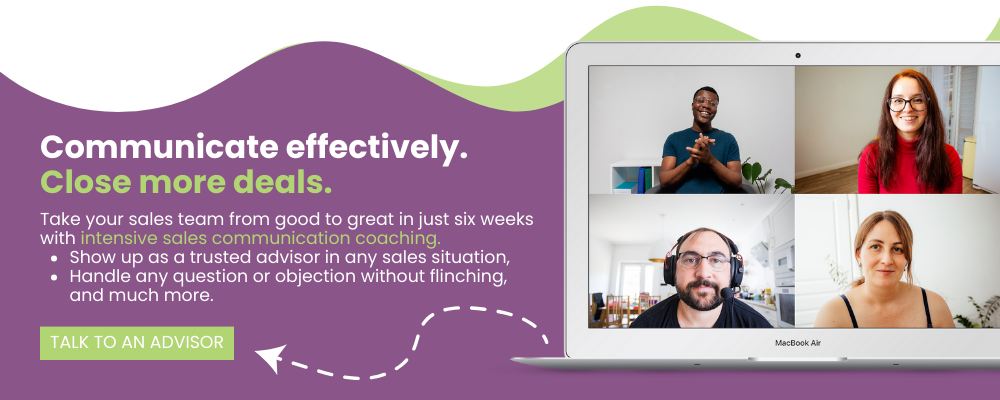Authenticity over Approval: An Interview with Chris Marr
We all want to communicate better. Being a great communicator helps build authority and trust. In the latest episode of Trustbuilders, I had the honor of interviewing Chris Marr about how your attitude, and consequently your communication, impacts your ability to build trust.
You can listen to the podcast on all major streaming platforms or watch it here:
Chris Marr is a seasoned marketing professional and coach. His path converged with Marcus Sheridan, the author of the game-changing book "They Ask, You Answer," in 2013 when Marcus recognized Chris’s potential and brought him into the fold. This started a decade-long journey in the world of They Ask You Answer, a philosophy that reshaped his career. Today, he is Impact's Global Coaching Performance Director and the author of the book "Become an Authoritative Coach."
#1: The Best Businesses Want To Do What Is Right By Their Customers, Not Just Make Money
Chris Marr has helped hundreds of businesses implement They Ask You Answer, and he has seen first-hand many times over what happens when a company embraces this business philosophy: how their attitude shifts, the ways they communicate change, and the way they approach business growth transforms.
The seed of this powerful transformation is usually already there. The CEO, business owner, or founder is not only driven by the need to make money, but they are also pursuing something bigger than themselves.
- They have always despised the smoke and mirror tactics prevailing in their industry.
- They want to pull back the curtain to be honest and transparent.
- They know that they can't make their customers buy from them, but they can involve themselves in that conversation.
- They know they should give their buyers all the information they need to make the right decision for their needs.
But often times, they don't know how to do it or they feel like they need "permission to be honest", as one business leader once said it to me.
The best companies that Chris has ever worked with are those that inherently understand that an educated buyer is a happy buyer and that trust is essential for buyers to buy. Companies that have been doing this for a decade are now known for being transparent and trustworthy. Look at Yale Appliance, LazyBoy, RoofCrafters, Custom Built, and many others. He explains that, "they know that with every article and every video they publish, they put a credit in their bank account of trust."
#2: The Mindset Shift Impacts How We Communicate With Our Buyers
One of the most powerful ways to illustrate how such a mindset shift impacts your company is how you change to communicate with your buyers.
Let's say you are in a sales conversation. You know that good-fit customers lead to shorter sales cycles, higher revenue, improved customer loyalty, better referrals, word of mouth, and so on while bad-fit customers usually complain, ask for refunds, and badmouth your company.
So imagine, as this conversation goes on, you figure out that your product or service isn't a good fit for that person. Maybe they feel you are too expensive or you know the many steps ahead, and at this point, they might not be ready for this approach. And rather instead of trying sell them anyway, you honestly say: "This might not be a good fit for you."
Your buyer, who is used to constantly being sold to, might be taken aback. They might say something like: "What do you mean? You aren't going to try to sell to me?" They instantly get a sense that you are truly going to help them instead of just trying to sell something. This disarms someone right away. Now, oftentimes, the conversation flips, and the buyer wants to be sold to.
But be careful! Using this as a "bait and switch" or in a manipulative manner will destroy any trust you might have built. However, if used correctly to genuinely help people, this is extremely powerful.
#3: Our Need To Please People Undermines Our Self-Respect And Our Ability To Build Trust
One of my absolute favorite things about coaching companies in their They Ask You Answer Mastery journey is that moment when the leaders and salespeople allow themselves to let go of that desperate need to appeal to every customer. Once they overcome that desperation to sell and start believing in their brand, in their product or service, and in their customers making the right choice for them, everything changes. The transformation literally unfolds in front of my eyes.
Chris explains this phenomenon really well by laying out the relationship of wanting to be liked by others (and therefore trying to do things that will please people) and the respect we have for ourselves (and our brand).
The need to be liked comes from external forces. We feel validated by others approving of our actions. In sales, we often feel liked and appreciated when we close a deal. However, selling everything to everyone just to make a sale (e.g., by agreeing to heavy discounts or making other concessions you aren't happy about making but you feel like you need to) will not only make us feel hollow and shallow in the long-term, but it is also bad for business.
Now, if we look at self-respect on the other hand, we quickly see that that comes from within ourselves. Chris explains that there is an inverse relationship between needing to be liked and respecting yourself. "To decrease your need of being liked, you need to increase your self respect. [...] The way I see it is that you can either be an empowering peer or a people pleaser, but you can't be both."
Many people are scared to embrace stepping into the role of an empowering peer because they feel that statements like "This might not be a good fit for you." might push people away. However, the opposite is true. Once you move to a peer status and empower people, you will find that it actually draws people in. This will not only lead to much deeper, long-lasting relationships with your customers, but also other people in your life.
Think about your own life: Who do you go to when you want to hear the truth? And then ask yourself, is that someone you could be for other people without making it about you?
#4: Radical Candor Makes You A Better (Sales)Person
A lot of (sales)people believe that you have to have an extroverted alpha personality to become an empowering peer. Chris, after having taught hundreds of people about Radical Candor, a communication framework and book by Kim Scott, knows that that's simply not true. Instead, all it takes is that you care deeply about the success and wellbeing of the other person and clearly say what you see (challenge them directly).
Chris gives an example of telling someone they have food stuck between their teeth before a presentation or being on camera. You could avoid saying something (ruinous empathy) because it is too uncomfortable, embarrassing, awkward, etc., or you can tell the person straight up and have an incredible impact.
He explains that the difference between someone who is ruinously empathetic and radically candid is like the difference between an amateur who is nice, people-pleasing, and getting by and a professional who is kind, straightforward, and gives you critical feedback. Both are trying to help you, but only one is actually helpful.
Conclusion
In conclusion, the episode with Chris Marr on Trustbuilders dives deep into the transformative power of adopting a mindset focused on honesty, transparency, and building trust. From prioritizing what is right for customers over profits to embracing radical candor in communication, the key takeaways highlight the impact of our attitudes on the relationships we foster.
If you want to learn more about how to become an empowering peer, improve your sales techniques, and cultivate trust in your interactions, I highly recommend listening to the full episode. Don't miss out on the valuable insights shared by Chris Marr and take the first step towards enhancing your communication skills. Like and follow the Trustbuilders podcast for more episodes that will inspire and empower you to build stronger connections in both your personal and professional life.
Share this
You May Also Like
These Related Stories

How Radical Candor® Can Drastically Improve Your Sales Outcomes

The Key to Building Trust in a Zero-Click World: Highlights from IMPACT Live

.png?width=250&height=125&name=TrustBuilderLogoWhiteTranspBackgr(250x125%20px).png)


No Comments Yet
Let us know what you think